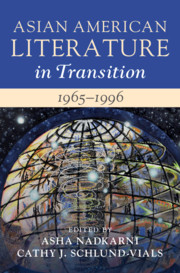Book contents
- Asian American Literature in Transition, 1965–1996
- Asian American Literature In Transition
- Asian American Literature in Transition, 1965–1996
- Copyright page
- Contents
- Contributors
- Series Preface
- Introduction
- Part I Immigration, Migration, and Movement
- Part II Politics, Art, and Activism
- Part III Institutionalization and Canon Formation
- Part IV Diaspora and the Transnational Turn
- Chapter 15 Rethinking Nationalistic Attachments through Narratives of Return
- Chapter 16 Diasporic Longings
- Chapter 17 Transnational Sexualities
- Chapter 18 Intimacy, Imperialism, and America: Revisiting Post-47 Postcolonial and Asian American Writing
- Chapter 19 Hemispheric Imaginings and Global Transitions: The Geopolitics of Asian American Literature in the Americas
- References
- Index
Chapter 18 - Intimacy, Imperialism, and America: Revisiting Post-47 Postcolonial and Asian American Writing
from Part IV - Diaspora and the Transnational Turn
Published online by Cambridge University Press: 08 June 2021
- Asian American Literature in Transition, 1965–1996
- Asian American Literature In Transition
- Asian American Literature in Transition, 1965–1996
- Copyright page
- Contents
- Contributors
- Series Preface
- Introduction
- Part I Immigration, Migration, and Movement
- Part II Politics, Art, and Activism
- Part III Institutionalization and Canon Formation
- Part IV Diaspora and the Transnational Turn
- Chapter 15 Rethinking Nationalistic Attachments through Narratives of Return
- Chapter 16 Diasporic Longings
- Chapter 17 Transnational Sexualities
- Chapter 18 Intimacy, Imperialism, and America: Revisiting Post-47 Postcolonial and Asian American Writing
- Chapter 19 Hemispheric Imaginings and Global Transitions: The Geopolitics of Asian American Literature in the Americas
- References
- Index
Summary
This chapter addresses two moments in world history: the 1940s, with World War II, decolonization, and the emergence of postcolonial nation-states, and the 1980s, which saw new modes of ethno-nationalism, genocide, the end of the Cold War, and a global reckoning with war trauma. By analyzing two novels that link postcolonial and Asian American literatures – Anita Desai’s Baumgartner’s Bombay and Vikram Seth’s The Golden Gate – I argue that their representation of transnational histories of human and ecological trauma provincializes America, as well as the nation-form. Taken together, these novels depict minority lives that negotiate British imperialism in Asia, the Holocaust, the 1947 Partition of India, World War II, Japanese internment, the Cold War, and ecological destruction. These novels map the lost intimacies of four continents in the middle of the twentieth century. They bear witness, inscribe postmemory, and enact genocidal remembrance – and they do so to provincialize the nation as an imagined community. They reveal its consolidation forged in geopolitical violence, and illuminate the unraveling of human rights for those rendered ethno-racial minorities in the nation.
- Type
- Chapter
- Information
- Asian American Literature in Transition, 1965–1996 , pp. 326 - 344Publisher: Cambridge University PressPrint publication year: 2021

